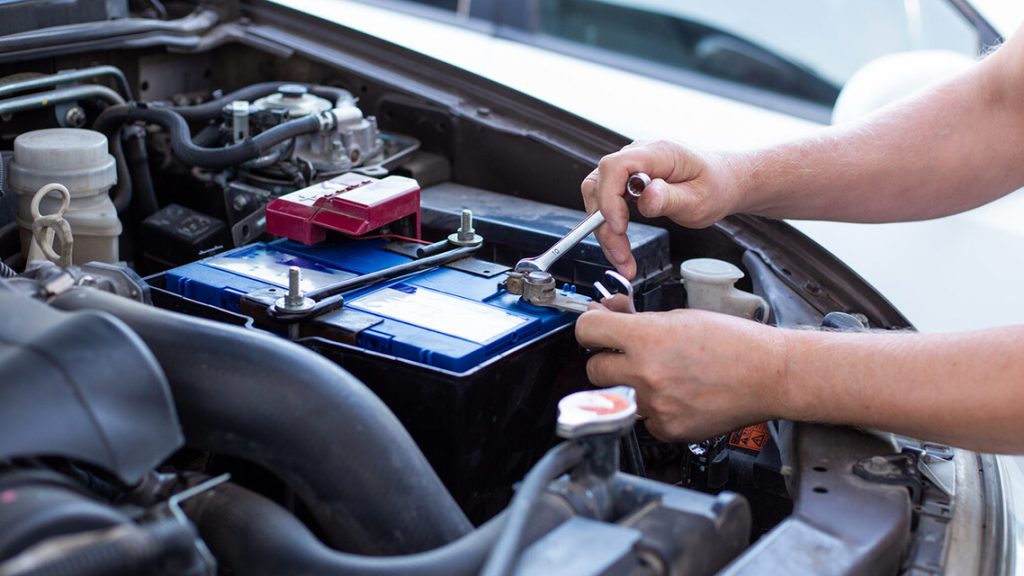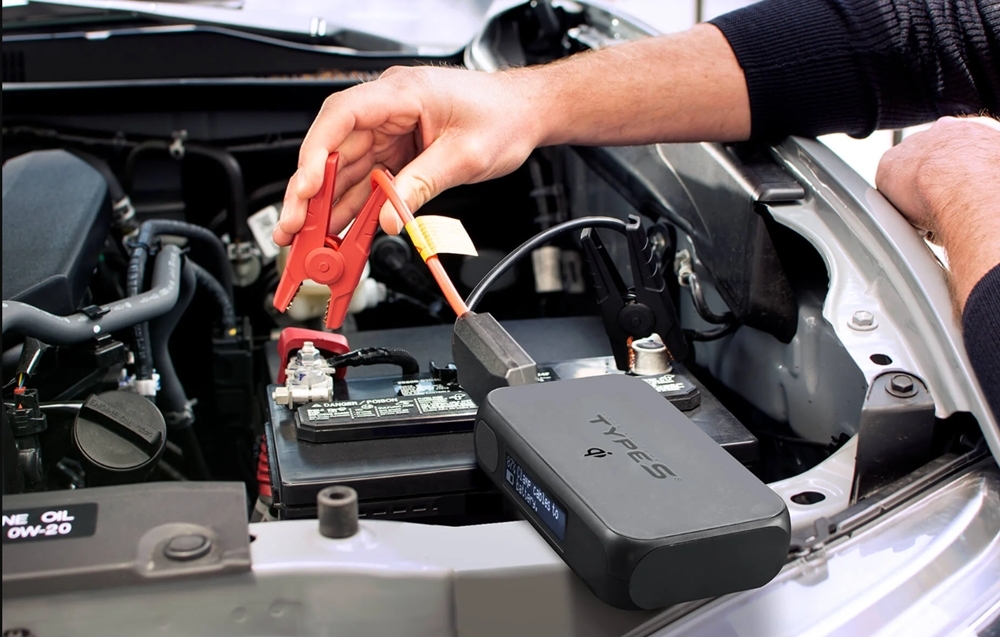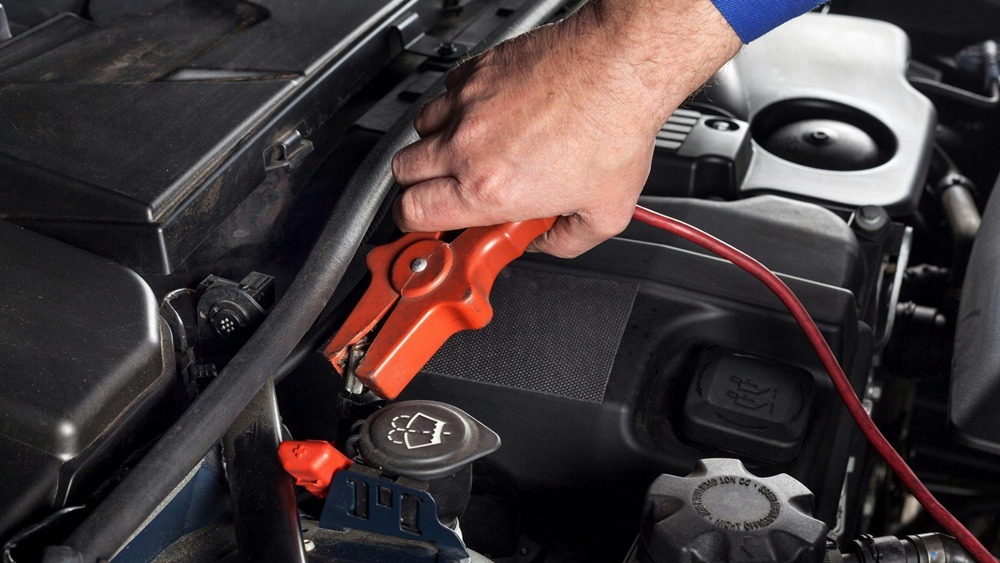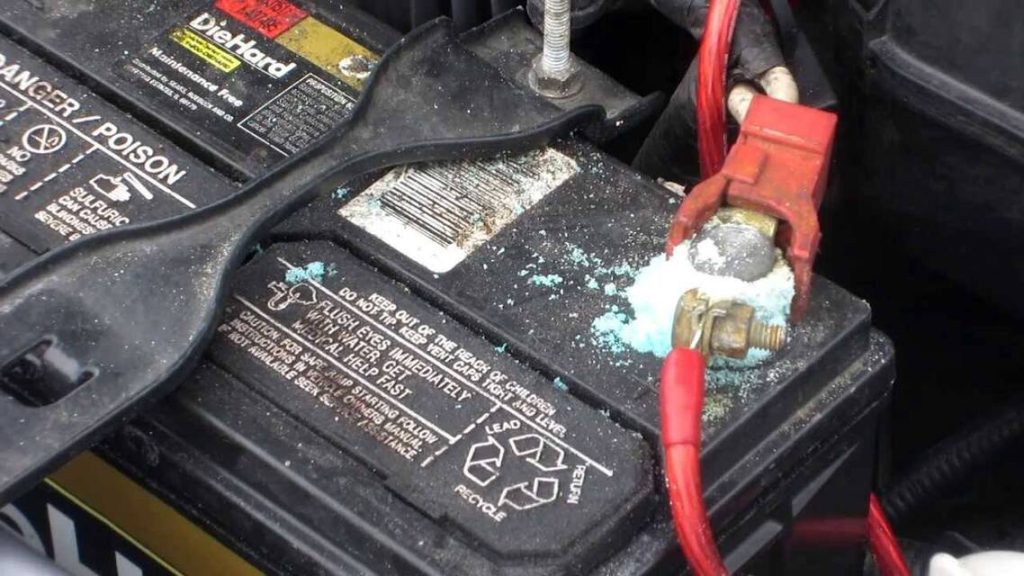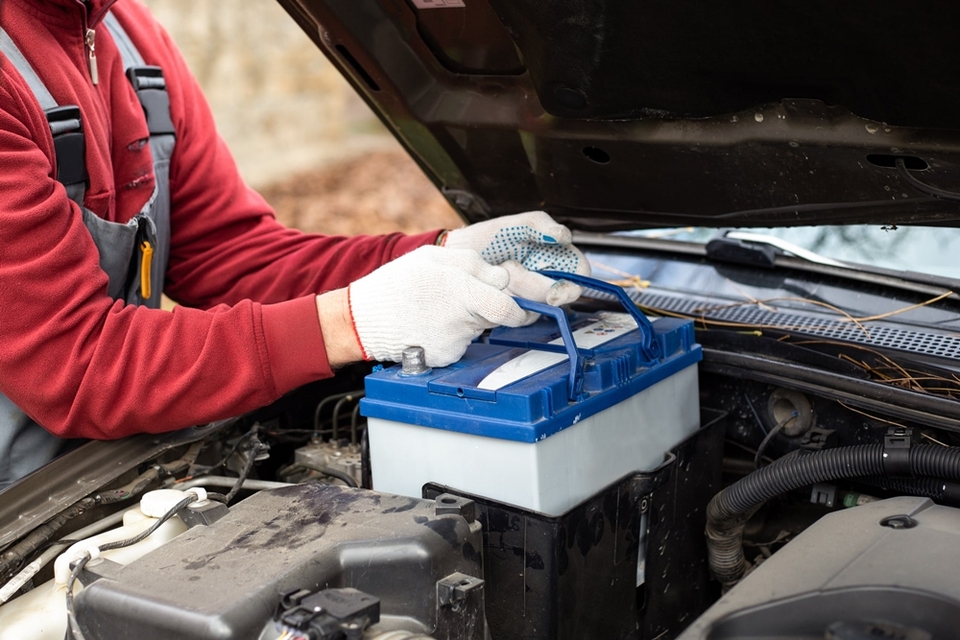Overview
How long does a car battery last and how often should a car battery be replaced? This is a question that almost every vehicle owner will ask at some point. Whether you’re sitting in a parking lot with a car that won’t start or simply trying to plan for future maintenance costs, understanding how long a car battery lasts is essential. In this comprehensive guide, we’ll explore everything from the average lifespan of different battery types to warning signs that your battery is failing.
We’ll also share practical tips to extend your battery’s life and help you recognize when it’s time for a replacement. By the end of this article, you’ll have a solid understanding of how long does a car battery last, along with the tools to ensure your vehicle starts reliably every time you turn the key.
Also read: 7 Surprising Ways to Cut Your Car Battery Replacement Cost
How Long Should A Car Battery Last
So, how long does a car battery last on average? The truth is, there’s no one-size-fits-all answer. Most conventional lead-acid car batteries last between 3 to 5 years, but this can vary significantly based on numerous factors.
When I bought my first car, I was surprised when the battery died after just two years. I later learned that my short daily commutes weren’t allowing the battery to fully charge, which dramatically shortened its lifespan. On the flip side, my dad’s truck battery lasted nearly 7 years because he drove it on longer trips regularly and kept it in a garage.
Also read: How to Clean Corrosion Off Car Battery: 6 Steps to Complete Terminal Cleaning
Here’s What Affects Your Battery’s Lifespan:
How long does a car battery last can depend heavily on several external and internal factors. Here are the most common ones:
- Climate conditions: Extreme temperatures are battery killers. In very hot climates, batteries often last only 2–3 years, while moderate climates may see batteries last 5+ years.
- Driving habits: Short trips prevent full recharging and can reduce battery life by up to 50%.
- Vehicle electrical demands: Modern cars with numerous electrical components place higher demands on batteries.
- Battery type: Different battery technologies have different expected lifespans.
- Maintenance: Regular battery checks and cleaning can extend life significantly.
The Battery Council International notes that nearly 70% of battery failures are due to sulfation buildup or degradation of internal components rather than complete failures. This means many batteries don’t suddenly die but gradually lose their ability to hold a charge—directly impacting how long does a car battery last in real-world use.
Also read: How To Jump A Car With Jumper Cables: Easy 10 step Guide

Myths About Car Batteries Debunked
When it comes to how long does a car battery last, there’s a surprising amount of misinformation out there. Let’s set the record straight by debunking some of the most common car battery myths—and explaining how they impact your battery’s actual lifespan.
Myth #1: Car batteries last longer if you drive less.
Truth: Many people assume that minimal driving means less wear and tear. In reality, how long does a car battery last is heavily influenced by regular use. Short trips and long periods of inactivity don’t give the battery enough time to fully recharge, which can actually shorten its life. Batteries thrive on consistent, adequate charging cycles.
Myth #2: All car batteries are the same.
Truth: This couldn’t be further from the truth. From traditional lead-acid batteries to AGM and lithium-ion types, each offers different benefits and expected lifespans. Understanding how long does a car battery last starts with knowing what kind of battery you have. For example, lithium-ion batteries can last 8–10 years, while basic lead-acid models usually top out around 5 years.
Myth #3: If your car starts, your battery is fine.
Truth: A starting engine doesn’t guarantee your battery is healthy. Many drivers discover their battery is on the verge of failure only after experiencing dim headlights, a slow crank, or warning lights. The reality is, how long does a car battery last isn’t just about whether your car starts—it’s about consistent, reliable performance. Regular testing is the only way to be sure.
Myth #4: You don’t need to maintain modern car batteries.
Truth: While “maintenance-free” batteries are common today, that doesn’t mean you should ignore them. Corrosion, loose terminals, or extreme temperatures can all shorten how long does a car battery last. Cleaning the terminals and checking voltage levels can go a long way in extending battery life.
Myth #5: A dead battery always means replacement.
Truth: Not necessarily. If you left your headlights on overnight or had a parasitic drain, a recharge might solve the problem. But if the battery dies repeatedly, it’s a sign that it’s reaching the end of its lifespan. Knowing how long does a car battery last—and recognizing when it’s time to test or replace it—can save you from getting stranded.
Warning Signs Your Battery Is Failing
When wondering how long does a car battery last or how often it should be replaced, it’s important to recognize the warning signs that your battery is nearing the end of its life. Being proactive can save you from the inconvenience of an unexpected breakdown.
I remember the day my battery was on its last legs. My car’s headlights seemed dimmer than usual, and the engine cranked sluggishly before starting. The next morning, I couldn’t start the car at all. Had I recognized these signs earlier, I could have replaced the battery on my own schedule rather than calling for a tow.
7 Critical Signs You’re About to Get Stranded
- Slow Engine Crank
If your engine turns over sluggishly or takes longer than usual to start, your battery may be struggling to hold a charge. - Dimming Headlights & Electrical Issues
Flickering or dim headlights, slow power windows, or weak dashboard lights are red flags your battery is weakening. - Battery Warning Light
A glowing battery icon on your dash means the charging system isn’t working properly — don’t ignore it. - Swollen Battery Case
A bloated or warped battery case is often caused by extreme heat and can lead to internal damage and failure. - Corrosion Around Terminals
White, green, or blue buildup around your battery terminals can prevent proper charging and indicates acid leakage. - Battery Age Over 3 Years
Most car batteries last 3–5 years. If yours is older than 3, have it tested even if it seems fine — failure could be sudden. - Clicking Sound When Starting
A rapid “click-click-click” when turning the key usually means your battery doesn’t have enough juice to crank the engine. At this point, you’ll likely need a jump start or a replacement—another reminder that how long does a car battery last can vary, but recognizing the symptoms early makes all the difference.
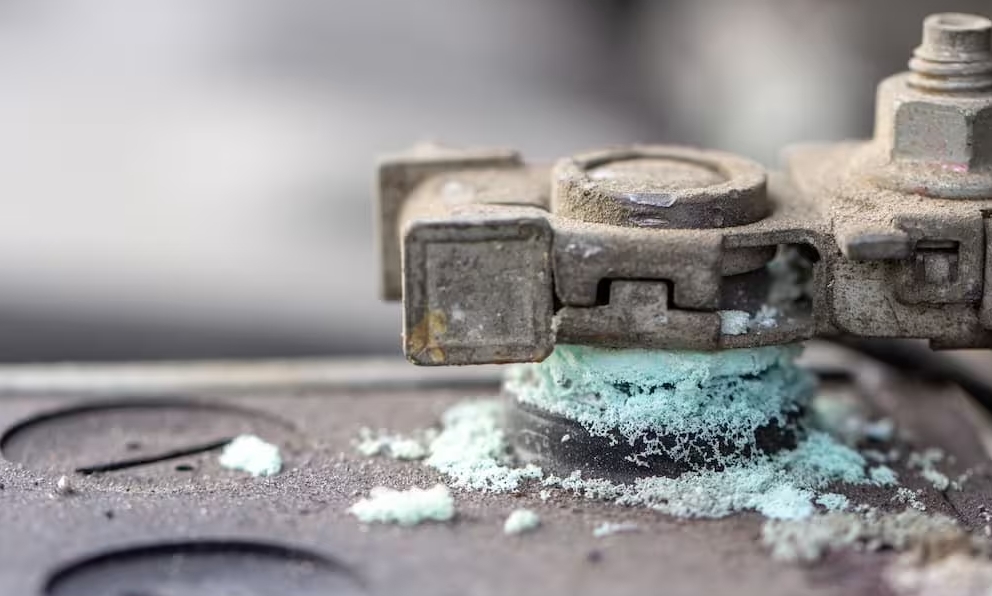
Different Battery Types and Their Lifespans
When considering how long does a car battery last, it’s crucial to understand that not all batteries are created equal. Different battery technologies offer various advantages and expected lifespans.
Lead-Acid Batteries (Traditional)
These are the most common and affordable option, typically lasting 3–5 years. They’re reliable but require maintenance in some cases and don’t handle deep discharges well. If you’re wondering how long does a car battery last under standard conditions, this is usually the benchmark.
AGM (Absorbent Glass Mat) Batteries
These premium batteries typically last 5–7 years and offer better performance in extreme temperatures. They’re sealed and maintenance-free, with better resistance to vibration.
I upgraded to an AGM battery in my SUV after moving to Arizona, and the difference was remarkable. Even during 110°F summer days, my car started without hesitation, and that battery lasted nearly 6 years despite the punishing heat.
Lithium-Ion Batteries
When discussing how long does a car battery last with lithium-ion technology, we’re looking at much longer lifespans. Though significantly more expensive upfront, lithium-ion batteries can last 8–10 years or more and offer better cold-weather performance.
Deep Cycle Batteries
These are designed for sustained power delivery rather than the high starting burst needed for engines. They’re commonly used in RVs and boats and can last 4–8 years depending on usage patterns.
Here’s a quick comparison of different battery types:
| Battery Type | Average Lifespan | Best For |
| Traditional Lead-Acid | 3-5 years | Budget-conscious drivers |
| AGM | 5-7 years | Extreme climates, high-end vehicles |
| Lithium-Ion | 8-10+ years | Long-term investment, electric vehicles |
| Deep Cycle | 4-8 years | RVs, boats, vehicles with high electrical demands |
How to Extend Your Car Battery’s Life
Wondering how long does a car battery last if properly maintained? With the right care, you can significantly extend your battery’s life beyond the average. Here are practical tips to help your battery last longer:
Regular Driving
Batteries recharge while driving, so regular use keeps them healthier. Short trips don’t allow full recharging, so try to take longer drives occasionally.
When I was working from home during the pandemic, I made it a point to take my car for a 30-minute drive twice a week even though I wasn’t commuting. This simple habit prevented my battery from draining completely and needing replacement.
Keep It Clean
Corrosion on terminals can prevent proper charging. Clean terminals with a solution of baking soda and water, then rinse with clean water and dry thoroughly.
Check for Parasitic Drains
Modern vehicles have numerous electronics that can drain your battery when the car is off. Have a mechanic check for unusual drains if your battery regularly dies. Preventing these issues plays a big part in maximizing how long does a car battery last.
Limit Short Trips
If possible, combine errands to avoid multiple short trips that don’t allow the battery to fully recharge.
Protect from Temperature Extremes
- In hot climates: Park in shade when possible and consider a battery insulator.
- In cold climates: Consider a battery blanket for extremely cold nights.
Turn Off Electronics Before Starting
Reduce the load on your battery when starting by turning off lights, radio, and climate control before turning the key.
Regular Testing
Have your battery tested regularly, especially before extreme weather seasons. Most auto parts stores will test batteries for free—another simple way to monitor how long does a car battery last under your specific conditions.
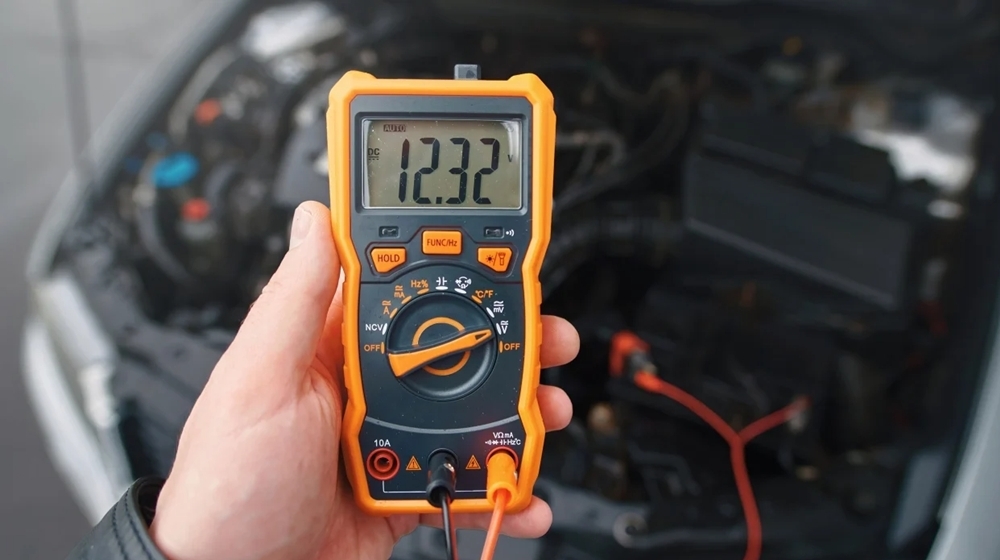
How Often Should A Car Battery Be Replaced
Understanding how long does a car battery last and how often it should be replaced can save you from unexpected breakdowns. While the average replacement interval is 3–5 years, it’s better to base your decision on battery condition rather than a strict timeline.
I learned this lesson the hard way when I ignored the signs of a failing battery during a cross-country road trip. The battery died in the middle of nowhere, and I spent hours waiting for roadside assistance. Now, I test my battery before any major trip.
Professional Testing
Battery load testing is the most accurate way to determine your battery’s health. This test measures the battery’s ability to maintain voltage while under load—one of the best ways to evaluate how long does a car battery last in your specific situation.
DIY Battery Assessment
You can perform basic checks yourself:
- Visual inspection: Look for corrosion, leaks, or a swollen case.
- Voltage testing: A healthy battery should read around 12.6 volts when the engine is off and 13.7 to 14.7 volts when running.
- Headlight test: Start the car and turn on the headlights. If they dim significantly when you rev the engine, your battery may be failing.
Replacing a Battery Based on Conditions
Climate and driving habits should influence your replacement schedule:
- Hot climates: Replace every 3 years as a precaution.
- Cold climates: Test before winter and replace if there’s any doubt.
- Infrequent drivers: Consider replacement every 3–4 years regardless of mileage.
Replacing Multiple Batteries
For those asking how long does a car battery last in vehicles with dual batteries (like some diesel trucks), it’s important to replace both batteries at the same time—even if only one seems to be failing—to ensure balanced performance.
Visual Battery Health Checklist
Use this simple checklist to quickly evaluate the current condition of your car battery:
Visual & Physical Inspection
- Battery is under 3–4 years old
- No visible corrosion around terminals
- No swelling or bulging on the battery case
- Battery cables are tightly connected
Performance Indicators
- Car starts easily with no slow cranking
- Headlights remain bright when idling
- No dashboard battery warning light is on
- Power windows and electronics function normally
Maintenance & Testing
- Battery is tested regularly (at least once a year)
- Terminals are cleaned periodically
- No history of repeated jump-starts or full discharges
🟢 7–11 boxes checked: Your battery is likely in great shape!
🟡 4–6 boxes checked: Time to monitor closely and consider testing.
🔴 0–3 boxes checked: Get your battery tested ASAP—it may be near the end.
Lithium Batteries: The Future of Car Power
As electric and hybrid vehicles become more common, understanding how long does a car battery last in this new era means turning our attention to lithium-ion technology. These advanced batteries function differently from traditional lead-acid batteries and require a unique approach to care.
Lithium Battery Lifespan
Lithium-ion batteries in cars typically last 8–10 years or 100,000+ miles. Some manufacturers even warranty these batteries for 8 years or more, which speaks volumes about their durability.
When my neighbor purchased a Tesla, she was concerned about the eventual battery replacement cost. After researching, she found that the battery was likely to outlast many other components of the car—potentially lasting well over a decade with proper care.
Factors Affecting Lithium Battery Life
- Charging habits: Frequent partial charges are better than complete discharge/recharge cycles.
- Temperature management: Lithium batteries have sophisticated cooling systems to prevent degradation from heat.
- Usage patterns: Heavy acceleration and high-speed driving can reduce battery life.
Maintenance of Lithium Batteries
Unlike traditional batteries, lithium batteries require minimal maintenance but do benefit from:
- Following manufacturer charging recommendations
- Avoiding extreme temperature exposure when possible
- Using scheduled maintenance to check battery health
Lithium Battery Cost Considerations
While lithium batteries last longer, they’re significantly more expensive to replace—often $5,000–$15,000 for electric vehicles. However, when calculating the cost over the battery’s lifetime, the annual cost may be comparable to replacing traditional batteries more frequently.

Frequently Asked Questions (FAQ)
1. How long does a car battery last on average?
Most car batteries last 3 to 5 years under normal driving conditions. However, factors like extreme temperatures, short driving distances, and lack of maintenance can shorten that lifespan. With proper care, some batteries may last up to 7 years.
2. How long does a car battery last in hot climates?
In very hot climates, the average car battery may only last 2 to 3 years. Heat accelerates internal corrosion and fluid evaporation, which can drastically reduce battery life.
3. How long does a car battery last in cold weather?
While cold temperatures slow the chemical reactions inside a battery, which may preserve it slightly longer, freezing weather also makes it harder for the battery to crank your engine. In colder regions, batteries typically last 4 to 5 years, but winter strain can lead to sudden failure.
4. How do I know when to replace my car battery?
Common signs include:
- Slow engine crank
- Dim headlights
- Clicking sound when starting
- Battery warning light on dashboard
- Corrosion or swelling around the terminals
If your battery is over 3 years old, it’s a good idea to have it tested.
5. Can a car battery last 10 years?
It’s rare, but lithium-ion batteries in electric or hybrid vehicles can last 8 to 10 years or more with proper maintenance. Standard lead-acid batteries usually don’t last beyond 5 to 7 years.
6. How can I make my car battery last longer?
To extend battery life:
- Take longer drives to keep the battery fully charged
- Keep terminals clean and free of corrosion
- Avoid leaving electronics on when the engine is off
- Park in shaded or temperature-controlled areas when possible
- Test the battery regularly, especially before extreme seasons
7. Does it matter how often I drive?
Yes. Cars that sit unused for long periods are more likely to develop a dead battery. Driving regularly, even just once a week for 20–30 minutes, helps your battery stay charged and healthy.
8. How long does a car battery last without driving the vehicle?
A car battery can go dead in as little as 2 to 3 weeks without being used, especially if the vehicle has electronics like alarm systems or infotainment units drawing power. Consider a trickle charger if you won’t be driving for a while.
9. Should I replace my battery before it dies?
Yes, it’s smart to replace your battery before total failure to avoid getting stranded. If your battery is approaching 3 years old and showing signs of wear, consider proactive replacement.
10. How long does a car battery last after a jump start?
A jump start doesn’t fix the underlying problem. If the battery is still good, it may last a while longer. But if it’s nearing the end of its life, even a jump start won’t keep it going for more than a few days to a few weeks without replacement.
Need a mobile mechanic? Find one on the Mobile Mechanic Directory
Final Thought: Maximizing Your Battery’s Potential
The question of how long does a car battery last doesn’t have a simple answer. Your battery’s lifespan depends on numerous factors—from the climate you live in to your driving habits and the type of battery you choose.
By understanding the warning signs of battery failure, performing regular maintenance, and making smart choices about when to replace your battery, you can avoid most unexpected breakdowns and extend your battery’s useful life.
Remember, proactive battery care is always less expensive and less stressful than dealing with a dead battery in an inconvenient location or during extreme weather. A small investment in battery maintenance can pay dividends in reliability and peace of mind.
Whether you drive a conventional vehicle with a traditional lead-acid battery or an electric vehicle with a sophisticated lithium-ion battery system, the principles of battery care remain similar: regular use, proper charging, protection from extreme conditions, and attentiveness to warning signs.
By applying the knowledge from this guide, you can ensure that your vehicle’s electrical heart keeps beating strongly for years to come—and understand exactly how long does a car battery last in your specific situation.

